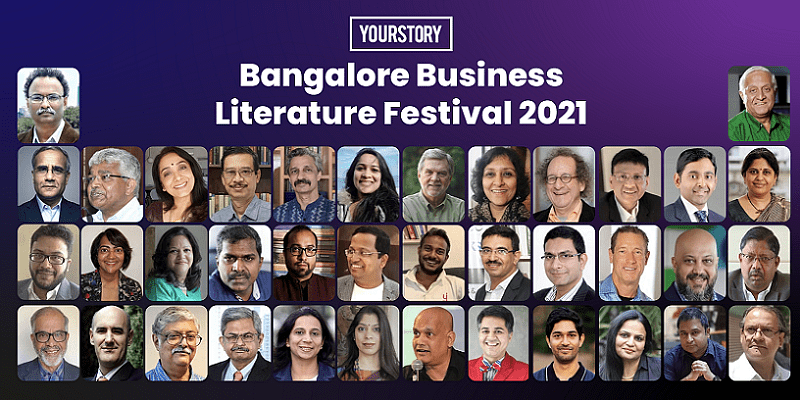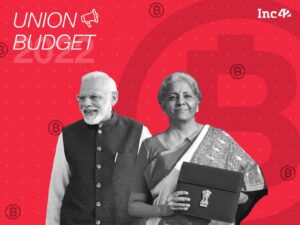The seventh annual Bangalore Business Literature Festival (BBLF) will be held entirely online this year due to the COVID-19 pandemic. YS is the media partner for BBLF; see our coverage of earlier editions in 2020, 2019, 2018, 2017, 2016, and 2015.
See also YS’s Book Review section with reviews of over 320 titles, and our compilation of 85 Quotes on World Book Day.
Our preview article series on BBLF 2021 begins with insights from 10 authors on scale strategies for startups, the role of leadership and culture, and cultivating customer and network connections.
BBLF 2021 will be held from September 21-23, with four-hour session spread across three evenings.
In the next five preview articles, we will present speaker insights on pandemic resilience, creativity habits, transformations in the book publishing industry, tips for bouncing back from failure, and the new models of literature festivals.
1. The power of networks
“In entrepreneurship, more than other fields, the most important skill in my opinion is the ability to connect with all kinds of people,” observes Kaninika Mishra, author of The Indic Quotient: Reclaiming Heritage Through Cultural Enterprise, in a chat with YS.
The entrepreneurs featured in her book have been great at forming networks. “The network, for most of them, has been directly or indirectly responsible for opportunities that came their way,” she says.
The field of cultural practices, content, and heritage poses its own unique challenges as well. “A common challenge for cultural entrepreneurs is to remain true to their purpose as they scale up. This becomes more challenging for those who get funded by large investors looking for growth and valuations,” Kaninika explains.
There is no one right path for cultural enterprises looking to broaden their consumer base. “A lot depends on the vision of the entrepreneur and their commitment to suppliers and vendors,” she adds.
2. Organisational culture
“There are a new set of challenges at every stage of scaling a company. Broadly, they can be classified as the ‘3 Ps’ – People, Product, and Process,” explains Bhavna Dalal, Founder and CEO of Talent Power Partners, and author of Checkmate Office Politics.
Political complications can and do arise in the startup journey. “The responsibility of addressing politics lies with the founders in setting the culture right,” she adds.
“The desired culture of the organisation must be designed consciously. There needs to be a clear understanding and consequences on what will not be tolerated and what will be rewarded,” Bhavna says; the last chapter in her book addresses such issues.
“The essence of the spirit of leadership is to create confidently yet humbly from uncertainty,” she evocatively says.
“The courage and confidence required, which allows you to do that, comes from a clarity of vision and a deep belief in yourself and your path. The surest way to success is to be clear on your personal definition of success, not that imposed and cluttered by societal conditioning. This lets you go against the grain at times to disrupt and create,” Bhavna advises.
3. Grit and persistence
“My advice is a little against the going tide. Much of media and books portray as if merely embarking on the path to entrepreneurship is the passport to phenomenal success,” cautions V Raghunathan, BBLF Chair and former Professor, IIM Ahmedabad.
His bestsellers include Games Indians Play, Ganesha on the Dashboard; The Corruption Conundrum; and Locks, Mahabharata and Mathematics.
“The common – albeit exaggerated – narrative celebrating entrepreneurs and startups is that if one does a certain set of things systematically with a bright idea, one will become a successful entrepreneur,” he observes.
But it is seldom emphasised that the success is only probabilistic. “For every 999 startups, probably only one succeeds as a unicorn – or for that matter, even becomes a sustainable business,” Raghunathan says.
“We rarely tell aspiring entrepreneurs that they will need oodles of persistence and grit to stay the course when they embark upon an uncertain venture, where everything that can go wrong does go wrong,” he warns.
For every controllable action, there may literally be 20 uncontrollable variables. “This is not to scare away aspiring founders from embarking on the entrepreneurship journey, but to tell them what it takes to be an entrepreneur,” Raghunathan clarifies. In fact, these issues are addressed in his forthcoming book.
4. Customers as fans and communities
Passion for the problem and the product are important for entrepreneurs, but so is the passion and connection of customers. This is particularly important in environments of noise and clutter.
“The ways to make community at the center of your business include getting closer to your fans through in-person or digital proximity, building trust through open communication, and listening to what your fans have to say,” advises David Meerman Scott, author of The New Rules of Marketing and PR and Fanocracy: Turning Fans Into Customers and Customers Into Fans.
“Do everything you can to make the relationship less of that of a cold company and a client, but an exchange of ideas between equal individuals,” he adds. He defines as fan is someone who is passionate about something in their life, whether that be a sport, art, hobby, TV show, or book.
Fans spend significant time and energy being involved with that activity or piece of media because they enjoy it. “Parts of their identities are often tied to these things they love. Fans also find friendship with other like-minded people who enjoy the same things they do,” David observes.
“In a digital world where our lives are increasingly cluttered and superficial, we’re missing something tremendously powerful: genuine human connection,” he cautions. People are going to be most invested in that which creates a sense of intimacy, warmth, and shared meaning in a world that would otherwise relegate them to a statistic.
That is the essence of creating a fanocracy. “There are many ways to foster meaningful connection, but the central idea is always putting the customer — the fan — first. It isn’t about the products and the services, but the people and the community,” David emphasises.
“The pendulum has swung too far in the direction of superficial online communications at a time when people are hungry for true human connection,” he laments.
“Be kind and generous. Offer ideas, information, or product with absolutely no expectation of anything in return,” David signs off. “Always remember, passion is infectious!”
5. The power of marketing
“The ideal pathway for a successful brand is to acquire mindshare, then create marketshare, and monetise that to profitshare,” advises Jessie Paul, CEO of B2B consulting firm, Paul Writer and author of No-Money Marketing: From Upstart to Big Brand on a Frugal Budget.
“Mindshare creation involves targeted awareness, and the larger the market you wish to address, the bigger the spend,” she adds. Many entrepreneurs focus on building a scaleable product, but unfortunately do not invest enough in a scaleable marketing engine.
“It’s no good having a product that can be used by a million people if only 10 people know about it. One of the biggest reasons companies fizzle out is the CEO’s belief that A good product speaks for itself,” she cautions.
In today’s crowded marketplace, the voice of the product needs to be amplified as well. “Word of mouth is a wonderful marketing tool, but growth will be very slow if that is the only channel. In the past, a Tally or Zoho or Patni were not unduly penalised for underinvesting in marketing, but in today’s super-fast winner-takes-all economy, you snooze you lose,” Jesse warns.
Unfortunately, many entrepreneurs struggle to find a good marketer. “But in order to hire a good marketer you need to invest in a good brand – a chicken-and-egg situation. Management guru Peter Drucker has said that marketing and innovation are the basic functions of an enterprise,” she explains.
“Most entrepreneurs are happy to own innovation, but they must own marketing as well, and hire or outsource the actual execution,” Jesse advises. Her book explains what is required to put together a cost-effective marketing plan.
“Own your customer. Control your variables. Everything else will follow,” she sums up.
6. Scaling the product and teams
There are two fundamental scale challenges for founders, according to Suresh Narasimha, serial tech entrepreneur, Co-founder at CoCreate Ventures, and owner of JustBooks, a library chain and platform.
“The first challenge is product-market fit, and the second is talent and ability of the team to scale. Often there is disparity between ability of the entrepreneur to scale and people around her or him,” he observes.
His venture JustBooks aims to make Indians read more by enabling convenience, discoverability, and affordability. “Consumers signup with JustBooks to discover the books they would love to read and borrow them for reading,” he explains.
JustBooks plans to launch a P2P book sharing network to operate globally. “We are also trying to bridge the gap where there are challenges of reading, such as elders who have problems reading at a long stretch or those who are visually challenged,” Suresh describes.
“Have humility to learn and yet confidence to believe in your purpose,” he advises aspiring entrepreneurs. “Get right mentor and angels to back you and handhold you. Think very big. The next decade will be 10X of last decade,” Suresh sums up on an inspiring note.
7. Lead and learn
“The biggest challenges for entrepreneurs are people driven – both building teams and also being kind to oneself,” observes Rishad Tobaccowala, Senior Advisor to the Publicis Groupe and author of Restoring the Soul of Business: Staying Human in the Age of Data.
“Uncertainty is not new. Life is uncertain. The key is to think long term and recognise that in addition to pioneering you must learn to be patient, be persistent and keep being perceptive about people and not just financials and technology,” he advises.
“The future does not fit in the containers of the past,” Rishad adds. He has written a blog on this topic as well.
As examples of organisations that have found a good balance between the human and tech sides, he cites Southwest Airlines, Costco, and Microsoft after Satya Nadella. “Each began with a focus on people and culture. There was an emphasis on learning mindset and autonomy granted, combined with clear goals that are measured to learn from and not to punish against,” Rishad explains.
8. Growth mindset and thought leadership
Three scale-stage challenges are identified by Karthik Nagendra, CEO of ThoughtStarters and author of The Thought Leader Way: Leading Your Business with Thought Leadership in an Altered World.
“Key challenges that entrepreneurs would face while scaling their business include access to best talent, right marketing strategy to compete at the next level, and delegating work among senior leaders,” he observes.
“By building a brand that is a game changer and has a purpose towards making an impact to people and planet, they will be able to attract best talent,” Karthik advises.
Outsourcing marketing to experts can help them scale up faster while creating that impact with better RoI. “Coaching the founders to trust and delegate to the next level of leadership to run the show further can help them scale their business faster,” he adds.
He believes the future belongs to those who have a growth mindset and those who are willing to invest in building thought leadership. “Entrepreneurs with the growth mindset develop plans to get clarity on the bigger picture. Once they understand what they want to achieve, they use these plans only as a guide,” Karthik says.
This helps them become flexible to make course corrections necessary to match the changing market dynamics. “They simply allow their path to success to be closer to them. Because of that, they achieve success,” Karthik explains.
“Additionally, investing in building thought leadership in a systematic manner will create a differentiation for their brands, capture better mind share, and thereby garner better market share in the future,” he sums up.
9. Learning from large firms
“Entrepreneurs must learn more from well-established companies by using the human metaphor of organisations. Everything that older people advise is not relevant, but some things are eternal as advice,” suggests R Gopalakrishnan, author of over 15 books on management, including A Biography of Innovations and Wisdom For Startups From Grown-ups.
The corporate veteran’s most recent book addresses this issue, and is titled Wisdom for Startups from Grown-ups: Discovering Corporate Ayurveda.
Gopalakrishnan advises founders and leaders to think of their enterprise like a new member of their family. “Impart consistent purpose and identity. Be financially conservative, and keep learning and adapting,” he urges.
10. Small-town entrepreneurs
Entrepreneurship needs to be spurred more in the smaller towns and cities of India, advises Vivan Marwah, user researcher and author of What Millennials Want: Decoding the Largest Generation in the World.
“Nearly 6 in 10 Indian millennials list a government job as their top choice for a job, and less than 2 in 10 want their own businesses. Unfortunately, economic insecurity and financial instability in small town India is rendering millions incapable of spending the time or money to start their own ventures,” he cautions.
Small-town millennials therefore need more access to capital, better institutional support, mentorship, and less red tape and regulation so as to be able to start their own businesses.
As corrective measures, Vivan suggests YCombinator-style accelerator programmes supported by PPP partnerships or by the government, no or low-interest loans for first time entrepreneurs, and tax breaks for startups.
“But these should be the floor, and not the ceiling of support. If young Indians are to be lured away from government jobs, it needs to be demonstrated that they can find success as entrepreneurs,” Vivan emphasises.
The road ahead
“Take the plunge. Swim as deep as you can. The result will be very rewarding,” Benedict Paramanand advises aspiring entrepreneurs. He is the co-founder of BBLF and author of CK Prahalad – The Mind of the Futurist (see my book review here).
“We noticed that startup entrepreneurs are spoilt for choice on gyaan about how they should run their ventures. We thought of focussing on a few less known and less talked about factors that make a big difference to their journey,” he adds, describing some of the panels at BBLF 2021.
With a wealth of insights from 34 speakers in 13 sessions spread across three days next week, BBLF promises to be a feast of ideas and tips for entrepreneurs, leaders and readers.
YS’s flagship startup-tech and leadership conference will return virtually for its 13th edition on October 25-30, 2021. Sign up for updates on TechSparks or to express your interest in partnerships and speaker opportunities here.
For more on TechSparks 2021, click here.








![Read more about the article [Funding alert] Saving and investment app Jar raises $4.5M from Tribe Capital, Arkam Ventures, WEH, Kunal Shah](https://blog.digitalsevaa.com/wp-content/uploads/2021/09/Jar-1630430206854-300x150.png)

